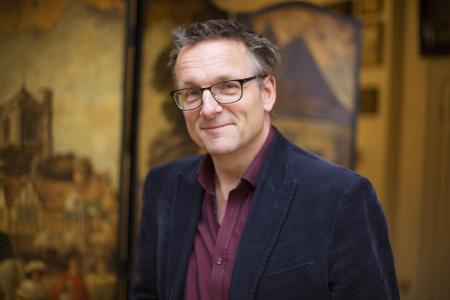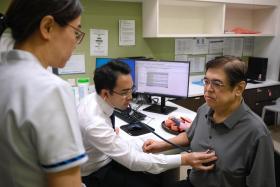From tapeworms to the rules of attraction: Meet the disrupter of human behaviour
Meet the doctor behind the best-selling diet plan who is now turning his attention to disrupting human behaviour
It isn’t every interview that starts with enquiring about the status of a parasite, but then Dr Michael Mosley is not your typical interviewee.
As a medical journalist, the doctor has often used himself as a “human guinea pig”, even to the extent of growing a tapeworm in his intestines 2014.
“I hope I don’t still have it. It never came out,” he tells The New Paper.
“But I think I would have noticed. When it is fully grown, it sheds segments so I would have seen them in the loo.”
If his name does not ring a bell, the diet plan he created will.
Mosley, 60, is behind The Fast Diet aka the 5:2 – where you drastically reduce your calorie intake for two days of the week to help your organs recover – and the world-wide best-selling books related to it.
But then there are plenty of media friendly medical experts (legitimate and self-proclaimed) giving their advice on all matters of the body.
Mosley has been producing fascinating insights into the edges of medicine for close over 20 years, yet it in the last decade he has moved in front of the camera, presenting documentary series such as Inside The Human Body, Infested: Living With Parasites and Medical Mavericks.
But while some “experts” happily push any fad going, Mosely says that he is not concerned about the negative connotations of the label “TV Doctor”.
“What I do is take the latest science and apply it. I rely on world experts. So when I did the Fast Diet, that was based on research coming out of the National Institute of Ageing and studies from the US and UK.”
He admits that what he promotes may seem odd at first.
“What I say may not be what your local doctor might say, but it is in line with what the latest science shows. I think there is a large gap between what the genuine experts know and what the medical profession knows.”
Mosely says that at medical school, he was warned that what might be the best knowledge at the time could turn obsolete within five years.
“Unless you keep up to date, you’re in danger of repeating what is out of date.”
So, with all his attempts to shake up medical thinking, does he see himself as a disrupter?
“Yes, I suppose I am because what I do is promote things that are not widely known.”
It was while producing a TV programme that Mosely saw the path of using himself as his own laboratory of sorts.
“I was heavily influenced by a man I made a programme about Barry Marshall, who wanted to show that stomach ulcers were not caused by stress but by bacteria.”
Marshall used himself to prove the theory, swallowing the bacteria.
“At the time it was seen as heresy, but he went on to win the Nobel Prize,” explains Mosley
“He’s the reason I got into self-experimenting and why I got in front of the camera.”
So from his research, especially the difficulties they have with diet, are humans hardwired to fit into routine?
“I think they get into a comfortable path and do things – favourite food, favourite seat, favourite path to work – over and over again. That’s what I want to disrupt.”
“That’s why I wanted to do this series Meet The Humans, because I’m really interested in human behaviour.
I wanted to explore why humans do what they do but also to disrupt them.
With each episode, Mosley and his team take a group of people, disrupt their comfortable lives and see what happens.
Set in a sprawling manor, the location is rigged with surveillance cameras and contributors fitted with observational devices. A group of unwitting test subjects are invited to take part in a range of group activities, from a flirty singles night to an awkward team building weekend. All secretly observed by Mosely and his team.
“(The subjects) don’t know what we are doing but I found it really interesting to observe and I learnt a lot.”
Mosley has found parallels with his diet research and the new series’ findings.
“Humans need to understand more about the psychology of why people do what they do. So in terms of diet, just saying “Eat less, do more exercise” is never going to work.”
Each episode of Meet The Humans covers a different topic such as nostalgia, attraction, competitiveness and fear.
“What is great is the unpredictably of human behaviour. Some of the experiments we did work brilliantly, some do not work at all. And that’s why I want to do more programmes on behaviour, because it is endlessly fascinating.”
Mosely worked with a team more accustomed to nature documentaries, which in itself brought another aspect into play into studying the humans.
The second episode’s focus is on the rules of attraction and throws up a number of surprises.
“What we did was study over two days what happens in a thousandth of a second of meeting someone. For instance, seeing what the correlation was of meeting someone you fancy based on voice, hearing and smell.”
Getting the participants to evaluate each other on all the senses other than vision threw up some wildly different results.
“Then we wanted to see if our predictions of who would get off with whom would be fulfilled.”
One of the participants in particular, who was dubbed “Dithering Dan”, who had to choose between two women, kept on flummoxing the experts with his choices.
“Part of the charm of the series is that myself and the other experts often disagree, and also we make predictions.”
I hope that audience will also make predictions about what happens next and that they’ll be as surprised as I was by the results.”
Meet The Humans is available on BBC Player, available via the BBC Player app or online at www.bbcplayer.com
Get The New Paper on your phone with the free TNP app. Download from the Apple App Store or Google Play Store now



